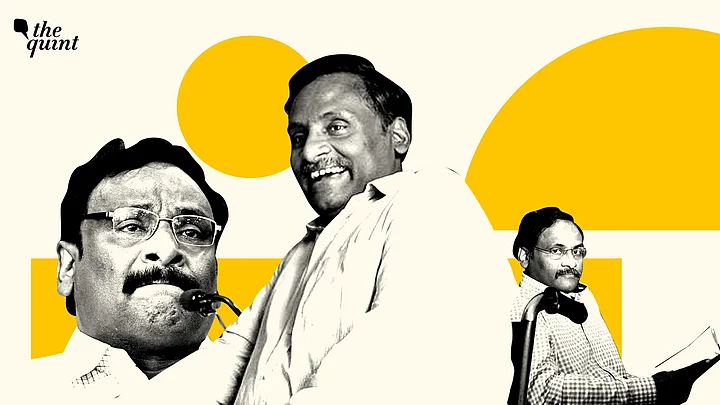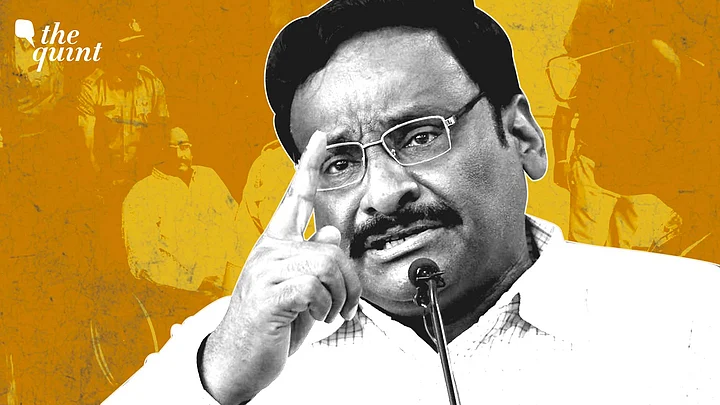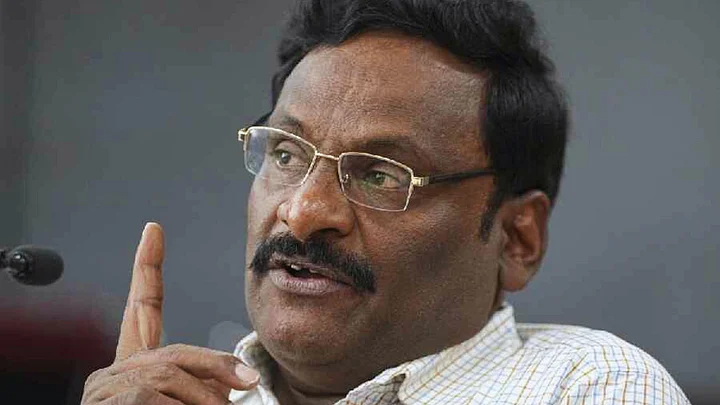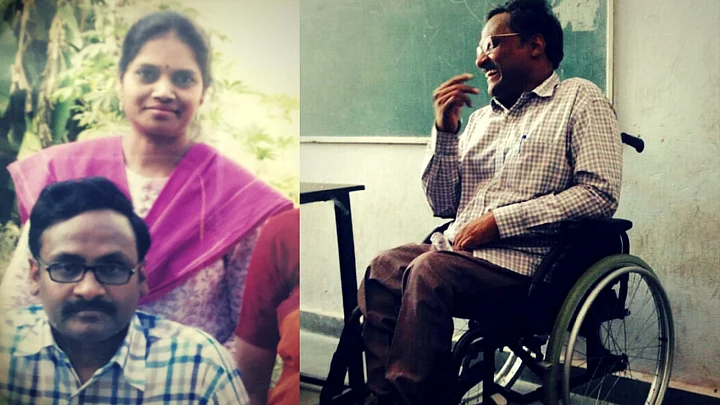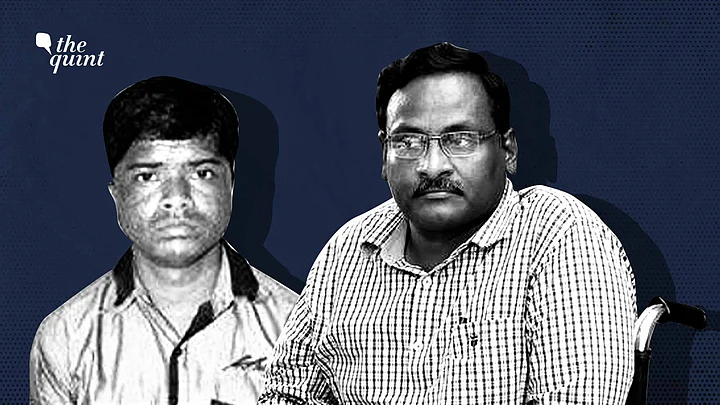“How will history judge my tenure,” asked Chief Justice of India DY Chandrachud as he began his final month in office.
In my adult lifetime, there have been few Supreme Court judges or CJIs more erudite, educative, eloquent (and dare I say loquacious) than Justice DY Chandrachud.
Today, however, as I try to make sense of the senseless death of GN Saibaba, that eloquence assaults me with a dreadful dissonance. It may have been more merciful to accustom us to silence.
GN Saibaba is dead. Pandu Narote is dead. Two lives were cut short by a wrongful UAPA conviction, on the strength of nothing besides “vague allegations that they have conspired to wage war against the government” (to quote the 5 March 2024 Bombay HC judgment that acquitted them, and ordered their release for a second time).
Two years ago to the day of writing this, (14 October 2022), the Bombay High Court discharged Saibaba and others, holding the “entire proceedings” of the trial to be “null and void.” To hear the Maharashtra Government’s appeal, the Supreme Court hastily convened an extraordinary hearing on a non-working day – Saturday, 15 October 2022 – and suspended the High Court order of discharge and release.
Justice Madan Lokur, a former Supreme Court judge, had asked if the “unprecedented” manner in which the Supreme Court suspended GN Sai Baba’s discharge marked “the beginning of another new abnormal.”
Two months after this conspicuously questionable order, the newly appointed CJI, Justice Chandrachud, in a lecture on 17 December 2022, talked up an order he himself had issued from the Supreme Court bench the previous day, correcting a trial court’s unclear language to protect a man from serving prison time in excess of what was intended.
He reiterated the point he had made in that order: no matter was too small to justify the SC’s exercise of its jurisdiction, because if it were not to do so, “a serious miscarriage of justice” would persist and “the voice of a citizen whose liberty has been abrogated would receive no attention.”
The CJI’s speech was widely perceived as an oblique but pointed reply to the Union Law Minister’s criticism of the Supreme Court for hearing trivial matters like bail pleas and PILs. But we should recall another vital context. He urged that, “Sermonising apart, trust us to be guardians of the liberties of our citizens.”
This was said in the midst of widespread dismay and alarm at the manner in which the Supreme Court (albeit before his tenure began) had gone to glaringly abnormal lengths to deny GN Sai Baba even a weekend’s worth of liberty. With the Supreme Court under this cloud of impropriety, was the CJI aware, perhaps, that his words might sound like hollow “sermonising”?
In August 2021, Justice Chandrachud delivered a lecture on “speaking truth to power,” urging citizens to “develop a temperament for questioning those in power.” In another lecture the previous month, he spoke of the role of the Supreme Court in protecting citizens against the misuse of criminal law, including the anti-terror law, in “quelling dissent.”
To illustrate, he quoted from his judgment granting bail to Arnab Goswami, stating, “Deprivation of liberty even for a single day is one too many.” But judicial conscience is not tested when it applies this principle to Goswami whose liberty is desired rather than endangered by power.
It is tested when called to apply it to protect those who speak truth to power when that power attacks their liberty and even life. Judicial conscience was indifferent when the establishment deprived octogenarian Father Stan Swamy, not only day after day of precious liberty, but of life itself.
In a keynote address delivered in July this year, CJI Chandrachud said that the Supreme Court “prioritised bail even during the vacations, for the simple reason that people must at least have their day in court.” But on this CJI’s own watch, Umar Khalid was denied his day in the Supreme Court.
Between April 2023 and February 2024, the Supreme Court managed to reschedule Khalid’s bail hearing no less than 14 times.
In the same speech, the CJI chided trial judges for “increasingly playing it safe” and not granting bail to those accused of “serious crimes.” The Supreme Court, he said, was “prioritising” the hearing of bail appeals “just to send this message across to the nation” that judges must do their duties without fear that “my career would be on the line if I were to decide in a particular way.”
This sermon to trial judges and the “message to the nation” appears to mock the judicial treatment of Umar Khalid’s bail plea. One Supreme Court judge and one High Court judge have recused themselves from the case without any discernible grounds. His bail plea in the Supreme Court was moved from bench to bench until it landed in the court of one particular judge, to whose bench several other politically sensitive cases have been moved contrary to rules.
A separate petition filed by Khalid challenging the constitutionality of some UAPA provisions should, by the Supreme Court rulebook, have been tagged with other pending challenges to the same law, and as legal journalist Saurav Das notes, “should have been tagged with the old pending challenges and made its way to Chief Justice’s court.” Instead, Das observes, “the Supreme Court registry, which is under the Chief Justice’s control, determined the “appropriate bench” to be the same bench to which his bail plea had been moved.
As a common citizen with no legal training, I cannot but wonder, surely the CJI, as the master of the Supreme Court roster, could have ended this farce and made sure that Khalid’s bail plea was heard by the judges (meeting the standards he demands from trial court judges) and not worry about repercussions in case of a decision that displeased the government?
Could he not ensure that Khalid’s challenge to the UAPA was assigned, as the rules require, to his own bench where other such challenges are pending?
The CJI urges trial court judges to apply “robust common sense” instead of rejecting bail simply because the accused is charged with serious crimes. For years, we have been told that a Supreme Court judgment (NIA vs. Zahoor Ahmad Shah Watali) restricts judges from exercising such common sense in UAPA bail cases. The current regime in particular has taken advantage of this to quell dissent: a UAPA allegation, however flimsy or fabricated, is enough to condemn students, teachers, activists, journalists, and intellectuals to indefinite years of jail without bail or trial.
In July this year the Supreme Court bench ruled that without denying the seriousness of UAPA charges, Watali did not qualify “as a precedent to deny bail to an accused under-trial suffering long incarceration with no end in sight of the criminal trial.” This ruling might still provide relief only to UAPA under-trials who have already “suffered long incarceration.”
On numerous occasions, Justice Chandrachud has spoken of the prison system’s duty to safeguard “the physical and mental health” as well as the human dignity of prisoners including convicts. He has said, “if a prisoner suffers from a disability, adequate steps have to be taken to ensure their dignity and to offer support.”
Does the CJI bear any responsibility when under-trials and prisoners in his home state are placed in anda cells (a euphemism for solitary confinement, ie, torture), or when courts ignore repeated warnings that it would kill the 90 percent disabled Saibaba, suffering a host of serious illnesses, if he is incarcerated in an anda cell where he had to crawl to use the toilet?
Presenting the draft constitution, the historic document achieved in his leadership, Dr Ambedkar did not speak of his legacy. Instead, he had expressed a prescient foreboding about the dissonance between the weak roots of constitutional morality and the prevailing dominance of majoritarian morality. If hero-worship for a leader were to give him a one-sided landslide electoral victory, he worried, it would be quite possible for “democracy to retain its form but give place to dictatorship in fact.”
In Justice Chandrachud’s public voice, we can hear the promise of constitutional morality. But should that public voice ask citizens to trust “democracy in form,” ie, the authority of formal institutions like courts, thus disarming them of the democratic scepticism towards this authority, when it chooses to serve “dictatorship in fact”?
(Kavita Krishnan is a women's rights activist. This is an opinion piece and the views expressed above are the author’s own. The Quint neither endorses nor is responsible for them.)
(At The Quint, we question everything. Play an active role in shaping our journalism by becoming a member today.)
